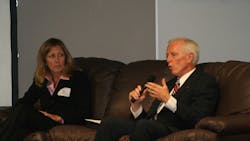Election 2012: Metals Industry Execs Say High Taxes, Regulations Disadvantage US Companies
Most politicians are clueless about manufacturing, as evidenced by their support for regulations and taxes that put U.S. manufacturers at a competitive disadvantage, said executives speaking at a manufacturing summit in Cleveland Monday.
The executives, representing steel service centers and other metals providers, offered their insight into key presidential election issues at the event hosted by the Metals Service Center Institute. The summit took place at the headquarters of tooling components manufacturer Jergens Inc.
Uncertainty is one of the manufacturing industry’s biggest enemies, said Robert Lapp, vice president of government affairs and community relations for Canton, Ohio-based Timken Co. (IW 500/197. Nobody in the industry knows what taxes, health care and regulations will cost in the upcoming year, he said.
A more simplified tax structure that includes a repatriation holiday could encourage more manufacturers to invest in the U.S., said Karla Lewis, executive vice president and CFO for metals service center Reliance Steel & Aluminum Co. (IW 500/124). Lewis said companies with overseas operations are “trapped” because they don’t want to be double taxed if they bring their profits back to the U.S.
Lapp agreed, saying he would like to bring money back from offshore operations, but the cost is too high. Research and development tax credits would make the U.S. more competitive as well, Lapp said.
Reduce Regulations
In many cases, the current regulatory environment in the U.S. has manufacturers scrambling for solutions that don’t exist or are too costly to implement, Lapp said. Regulators do not conduct a cost/benefit analysis before they implement new standards, placing an enormous burden on manufacturers, according to Lapp.
Lapp also criticized the federal government for enforcing regulations that don’t exist in competing countries. The number of agencies overseeing regulations makes it difficult for even a large company, such as Reliance Steel, to keep up with the ever-evolving requirements, Lewis said.
Regulations impacting natural gas development could hamper future manufacturing growth as well, Lapp said. He pointed to requirements that force power companies to switch from coal to natural gas, putting manufacturers in direct competition with the utility providers for this natural resource.
Gary Stein, president of Triple-S Steel Supply Co. in Houston, joked that “Angelina Jolie may make policy” decisions in the state of New York regarding natural gas. His comment was in reference to a New York Times article published Sunday that Gov. Andrew Cuomo would further delay shale gas development in his state by restarting the regulatory rule-making process. The Times reported that Cuomo has been influenced by environmentalists and celebrity activists.
Make Government Understand
Organized groups, such as activists and labor unions, often win support because they have a united voice, Lapp said. Similarly, manufacturers need to work more cooperatively to achieve their policy goals.
“There’s no other way they’re going to hear it unless they hear it from you,” Lapp told the audience of mostly manufacturing representatives.
“We have to start uniting ourselves and keep after these folks,” he said.
Manufacturers can increase their visibility to politicians by inviting them on plant tours, Lapp said.
Roger Sustar, CEO of Mentor, Ohio-based Fredon Corp. was less optimistic that any dramatic changes will happen until people with manufacturing backgrounds replace today’s elected officials.
“I don’t think there’s anyone there with the courage to change,” Sustar said.
A representative from Democratic Ohio Sen. Sherrod Brown’s office attended the event and said she would relay the panelists concerns to Brown.
Brown’s Republican challenger state Treasurer Josh Mandel was scheduled to attend the event but canceled because of unforeseen circumstances, said the program’s moderator Bob Weidner, who serves as president and CEO of the Metals Service Center Institute’s Northeast Ohio chapter.
For more on the manufacturing issues shaping the 2012 election, click here.
About the Author
Jonathan Katz
Former Managing Editor
Former Managing Editor Jon Katz covered leadership and strategy, tackling subjects such as lean manufacturing leadership, strategy development and deployment, corporate culture, corporate social responsibility, and growth strategies. As well, he provided news and analysis of successful companies in the chemical and energy industries, including oil and gas, renewable and alternative.
Jon worked as an intern for IndustryWeek before serving as a reporter for The Morning Journal and then as an associate editor for Penton Media’s Supply Chain Technology News.
Jon received his bachelor’s degree in Journalism from Kent State University and is a die-hard Cleveland sports fan.
